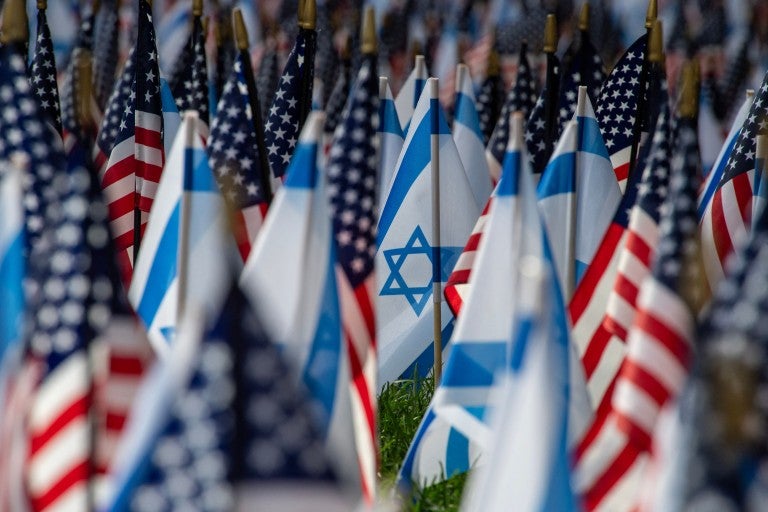June 3, 2024
This piece originally appeared in Atlantic Council
By Anne-Sophie Sebban-Bécache and Simon Seroussi
Israel’s global standing has been greatly damaged since Hamas’s October 7 terrorist attack. With the expansion of the Israel Defense Force’s (IDF) counter-offensive against Hamas and the increasing death toll in Gaza, Israel has now become the object of severe international criticism.
These condemnations sharply contrast with the past decade, which had largely been positive for Jerusalem on the global stage. Indeed, the Abraham Accords boosted Israel’s diplomacy and regional integration in the Middle East and North Africa, while the Jewish state’s expertise in technology, water, and irrigation was acclaimed worldwide. Israeli leaders were even among the few delegations to have been welcomed in Washington, Moscow, and New Delhi with warmth.
The war in Gaza has also affected African countries’ postures toward Israel, which had seen a sharp improvement in the past twenty years. Several nations on the continent, in addition to the African Union (AU), have directly criticized Israel for its actions in Gaza. However, as of now, most of these criticisms haven’t materialized into major diplomatic setbacks for Israel. It appears that the political, economic, and security dynamics that have been steadily developing since the early 2000s may be able to survive the public condemnation of Israel in several African capital.
Impact of the war on Africa-Israel relations
Even though Jerusalem initially received wide international support following Hamas’s onslaught, numerous African countries soon voiced criticism as the number of Palestinian casualties swelled.
In South Africa, the criticism has echoed historical Palestinian support for the African National Congress. At the end of December 2023, South Africa filed a lawsuit against Israel at the International Court of Justice, and Pretoria positioned itself as one of the major critics of the Jewish state globally. The president of the AU Commission, Chad’s Moussa Faki, publicly condemned Israel during the AU’s most recent summit in February. He called the Israeli offensive in Gaza “the most flagrant” violation of human rights. Comoros President Azali Assoumani went as far as denouncing “the genocide Israel is committing in Palestine under our nose.” Additionally, the prime minister of the Palestinian Authority was given a place of honor at the AU summit, while no Israeli delegation was invited. Finally, thirty-eight African countries voted in favor of a United Nations (UN) resolution calling for an immediate ceasefire in Gaza.
However, unlike with the Yom Kippur War (during which most African states suspended their diplomatic relations with Israel), the Second Intifada (during which Tunisia and Morocco cut ties with Israel), and the first Gaza War of 2009 (in response to which Mauritania told the Israeli ambassador to leave), African countries today have largely avoided drastic diplomatic steps against Israel.
Even Muslim-majority nations such as Morocco, Chad, and Sudan (the latter having had no official relations with Israel until a few years ago) have not gone beyond public condemnation of the war in Gaza. A number of Sub-Saharan nations—such as Togo, Cabo Verde, Cameroon, and South Sudan—abstained from voting for the UN ceasefire resolution. Kenya and Malawi agreed to send workers to Israel after Jerusalem stopped issuing work permits to Palestinians. Meanwhile, Ugandan Judge Julia Sebutinde was the only one at The Hague who opposed every single accusation leveled against Israel in South Africa’s case during preliminary hearings in January.
A long history of unique North-South Cooperation
The refusal (at least thus far) of African nations to break ties with Israel over the Gaza war, despite deep and publicly articulated differences, is rooted in an old relationship that has survived previous ups and downs.
Even before the creation of Israel, Theodor Herzl, the founder of the Zionist movement, expressed interest in the fate of Africa. One of the characters in his 1902 book Altneuland declares: “Once I have witnessed the redemption of the Jews, my people, I wish also to assist in the redemption of the Africans.”
After Israel’s independence, cooperation developed spontaneously and at full speed with many African countries. The 1960s have even been called the “golden age” of Israel-Africa relations. At that time, Israel maintained thirty-three ambassadors in Africa and its development aid, in proportion to Israel’s population, exceeded that of most Organisation of Economic Co-operation and Development members. Furthermore, Israel offered Africa a model of decolonization: It had managed to secure its self-determination from the British, win what is known in Israel as the war of independence against an alliance of armies from Middle East countries, and quickly overcome the challenges of self-sufficiency and development. Nelson Mandela himself took inspiration from Zionist paramilitary groups like the Irgun in leading the African National Congress’ armed wing.
Finally, the socialist model adopted by Israel’s first leaders established from the start a model of “egalitarian” cooperation with African countries, an approach which differed greatly from the one promoted by former European colonial powers.
However, as the Yom Kippur War broke out in 1973, Israel saw its relations with most Sub-Saharan African countries break down under the pressure exerted on the continent’s governments by the Arab League. Israel’s leaders felt deeply betrayed, which likely partly explains the absence of coherent reinvestment by Israel in Africa in the following decades. In the 1980s, African leaders expressed their frustration with Arab nations that had not kept their promises—in particular in the field of energy—in exchange for the break with Israel.
Following that frustration, and in the favorable context of the Oslo Accords, Israeli-African diplomatic relations were gradually re-established. From the mid-2000s onward, Avigdor Lieberman, while minister of foreign affairs from 2009 to 2012 and then from 2013 to 2015 , began a diversification of Israel’s diplomatic alliances and focused his efforts on African states. In 2016, Prime Minister Benjamin Netanyahu followed with a historic visit to East Africa. Then in June 2017, the Economic Community of West African States invited Netanyahu to address its summit. The Israeli prime minister was back in Kenya in November 2017 to meet eleven African leaders for a discussion on security cooperation in the geostrategically important Horn of Africa.
New paradigms
Still, as of 2024, Israel lacks ambitious economic and diplomatic policies to develop its ties with Africa. While it had thirty-three ambassadors on the continent in the 1960s, the Jewish state has today only thirteen diplomatic missions, three economic representations, and a single military attaché in Africa. This can be attributed to some combination of a limited Israeli strategy, narrow resources dedicated to its relationship with Africa, or the fact that African countries have been focusing their efforts on developing links with other international actors. Israel also continues to approach its diplomatic relationship with the continent mostly through the lens of its relations with the Muslim world. As such, the normalizations with Morocco and Sudan as well as the resumption of diplomatic relations with Chad were celebrated in Jerusalem as diplomatic breakthroughs within the Middle East and its periphery.
At the same time, several dynamics that have emerged in the past two decades are fueling an impressive acceleration in Africa-Israel relations beyond the periphery of the Middle East.
First, the Abraham Accords significantly modified the paradigm that had prevented Israel from fully integrating into the region without a peace treaty with the Palestinians. In the wake of these agreements, Jerusalem was able to undertake normalization discussions with other countries, with reports indicating it had initial conversations with Somalia, Comoros, and Niger. Israel inaugurated a diplomatic mission in Rwanda and recognized Moroccan sovereignty over Western Sahara. Malawi recently opened an embassy in Tel Aviv, while Sierra Leone and the Democratic Republic of the Congo announced their intention to do the same in Jerusalem. Israel has, in turn, committed to reopening a representation in Kinshasa after an absence of thirty years. In May 2022, the first diplomatic conference on Africa-Israel was organized in Paris by the Embassy of Israel in France and the American Jewish Committee. (The authors of this article were the organizers.) In January 2023, El Al, Israel’s national airline, commenced its first flights to West Africa, serving the Nigerian cities of Abuja and Lagos. Finally, the prospect of Israeli normalization with Saudi Arabia, which is still being discussed behind closed doors despite the current war, could further accelerate normalization with Muslim-majority African nations such as Somalia, Niger, Comoros, Mauritania, or Djibouti.
Second, Israel has been active at the multilateral level so as to strengthen its position on the continent. The Jewish state initially regained its observer status at the African Union in 2021, which it had lost in 2002 under Libyan pressure. The decision was however overturned the following year in a dramatic move that Jerusalem blamed on South Africa and Algeria. Before the current crisis, Israel had also initiated a quiet campaign at the United Nations to convince specific African states to move away from the non-aligned movement. These efforts had initial signs of success before the current war brought them to a halt.
Third, after experiencing the influence of former colonial powers, Cold War competitors, and powerful petrostates, Africa’s countries are now polishing their fully independent foreign policies. Their economies are rapidly growing, the continent’s political influence is starting to be felt globally, and major powers are competing with each other to put in place local partnerships. As such, African nations today are arguably less vulnerable to the external pressure that led to the diplomatic shutdowns of the Yom Kippur War and the Second Intifada. Israel appears to many of them as a pragmatic partner whose know-how in fields such as agriculture, water, and technology is essential to development.
Surviving the war in Gaza
The current war in Gaza is certainly a major step back for Israel’s diplomatic standing worldwide, including in Africa. The international pressure on Jerusalem might also increase as the IDF gears up for an offensive in Rafah, or if Israel’s tit-for-tat exchange of direct attacks with Iran continues.
However, the public criticism of the war does not appear to lead to the diplomatic consequences that prevailed during previous crises in the Middle East. Israel can be a pivotal partner in addressing many of the continent’s foremost development challenges for the decades to come, and most African leaders today seem unwilling to sacrifice this partnership.
The Abraham Accords, cemented in mutual security, diplomatic, and economic interests between Israel and several Muslim countries, appear to be strong enough to survive the current war. They could, in the long term, open the door to cooperation between Israel, other countries in the Middle East, and Africa. For example, Jerusalem could benefit from Morocco’s diplomatic and economic networks in Africa—particularly in the areas of banking and infrastructure. Likewise, sovereign funds from Gulf states interested in African markets represent an extraordinary financing opportunity for innovative Israeli companies supporting economic development on the continent.
After the war in Gaza ends, a new, integrated architecture could play a significant role for the two regions as they seek a more prosperous and secure future.
Anne-Sophie Sebban-Bécache is the director of American Jewish Committee Paris (AJC Paris) and was formerly an attaché at the political chancellery of the French embassy in Israel and at the Permanent Mission of France to the United Nations in New York. She holds a PhD in geopolitics focusing on Israel’s perceptions and politics towards the Horn of Africa.
Simon Seroussi is currently undertaking a mid-career master’s in public administration at the Harvard Kennedy School of Government. He previously served as the spokesperson of the Israeli embassy in France and the deputy chief of mission of the Israeli embassy in Cameroon.


